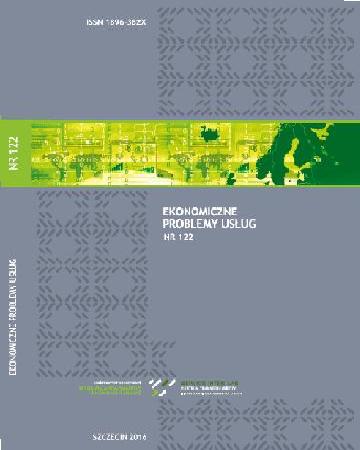
ISSN: 1896-382X
eISSN: 2353-2866
OAI
DOI: 10.18276/epu.2017.127-16



Issue archive /
nr 127 2017
Triangulacja w badaniach rachunkowości zarządczej
(Triangulation in management accounting research)
| Authors: |
Bożena
Nadolna
Zachodniopomorski Uniwersytet Technologiczny w Szczecinie Wydział Ekonomiczny Zakład Ekonomii i Rachunkowości |
| Keywords: | triangulation research methods management accounting |
| Data publikacji całości: | 2017 |
| Page range: | 13 (173-185) |
| Klasyfikacja JEL: | B41 M41 |
Abstract
This article aims to assess the use of triangulation methodology for selected research papers on management accounting. The article indicates the essence of scientific method, types of triangulation and its importance for social sciences research. The formulation of the conditions for the use of triangulation in management accounting research was a starting point for assessment of the selected test methods. In order to conduct this assessment there were chosen research works on management accounting. Assessment was made in terms of triangulation within the research process and its influence on quality of research. The results indicates that among analysed research works triangulation is most frequently applied at data collection stage. However, those findings cannot be generalised since the sample might not be representative.
Download file
Article file
Bibliography
| 1. | Anderson, S.W. (1995). A Framework for Assessing Cost Management Systems Changes: The Case of Activity Based Costing Implementation at General Motors, 1986-1993. Journal of Management Accounting Research, 7, 1-51. |
| 2. | Anderson, S.W., Hesford, J.W., Young, S.M. (2002). Factors Influencing the Performance of Activity Based Costing Teams: A Field Study of ABC Model Development Time in the Automobile Industry. Accounting, Organization and Society, 27, 195-211. |
| 3. | Anderson, S.W., Young, S.M. (1999). The Impact of Contextual and Process Factors on the Evalu-ation of Activity-based Costing Systems. Accounting, Organization and Society, 24, 525-559. |
| 4. | Campbell D., Fiske, D. (1959). Convergent and Discriminant Validation by the Multitrait-multime-thod-matrixs. Psychological Bulletin, 56, 81-105. |
| 5. | Clark, D. (1951). Plane and Geodetic Surveying for Engineers. London: T2. |
| 6. | Dent, J.F. (1991). Accounting and Organizational Cultures: A Field Study of the Emergence of a New Organizational Reality. Accounting, Organization and Society, 16 (8), 705-732. |
| 7. | Denzin, N.K. (1970). The Research Act. Chicago: Aldine. |
| 8. | Ferreira, L.D., Merchant, K.A. (1992). Field Research in Management Accounting and Control: |
| 9. | A Review and Evaluation. Accounting, Auditing and Accountability Journal, 5 (4), 258-269. |
| 10. | Flick, U. (2011). Jakość w badaniach jakościowych. Warszawa: PWN. Hajduk, Z. (2007). Ogólna metodologia nauk. Lublin: Wyd. KUL. |
| 11. | Ittner, C., Larcker, D. (2001). Assessing Empirical Research in Management Accounting. Journal of Accounting and Economics, 32, 348-359. |
| 12. | Kakkuri-Knuuttila, M.L., Lukka, K., Kuorikoski, J. (2008). Straddling between Paradigms: A Na-turalistic Philosophical Case Study on Interpretative Research in Management Accounting. Accounting, Organizations and Society, 33, 267-291. |
| 13. | Martyniak, Z. (1999). Metody organizacji i zarządzania. Kraków: Wyd. AE w Krakowie. Merchant, K.A. (1985). Organizational Controls and Discretionary Program Decision Making: |
| 14. | A Field Study. Accounting, Organization and Society, IO, 67-85. |
| 15. | Merchant, K.A. (1990). The Effects of Financial Controls on Data Manipulation and Myopia. |
| 16. | Accounting, Organization and Society, 15, 297-313. |
| 17. | Modell, S. (2005). Triangulation between Case Study and Survey Methods in Management Accoun-ting Research: An Assessment of Validity Implications. Management Accounting Research, 16, 231-254. |
| 18. | Medell, S. (2015). Theoretical Triangulation and Pluralism in Accounting Research: A Critica Realist Critique. Accounting, Auditing & Accountability Journal, 7 (28), 1138-1150. |
| 19. | Mruk, H. (2008). Istota i klasyfikacja metod naukowych. W: M. Sławińska, H. Witczak (red.), |
| 20. | Podstawy metodologiczne prac doktorskich w naukach ekonomicznych. Warszawa: PWE. |
| 21. | Nowak, S. (2011). Metodologia badań społecznych. Warszawa: PWN. Silverman, D. (2009). Interpretacja danych jakościowych. Warszawa: PWN. |
| 22. | Stachak S. (1997). Wstęp do metodologii nauk ekonomicznych. Warszawa: Książka i Wiedza. |